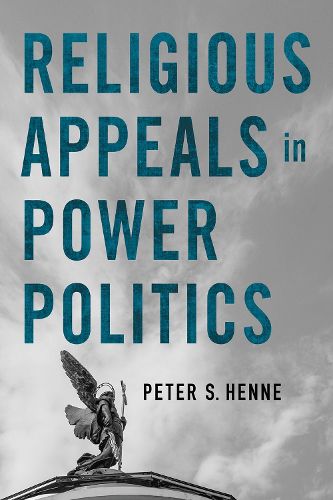Readings Newsletter
Become a Readings Member to make your shopping experience even easier.
Sign in or sign up for free!
You’re not far away from qualifying for FREE standard shipping within Australia
You’ve qualified for FREE standard shipping within Australia
The cart is loading…






Religious Appeals in Power Politics examines how states use, or attempt to use, confessional appeals to religious belief and conscience to advance political strategies and objectives. Through case studies of the United States, Saudi Arabia, and Russia, Peter S. Henne demonstrates that religion, although not as high profile or well-funded a tool as economic sanctions or threats of military force, remains a potent weapon in international relations.
Public policy analysis often minimizes the role of religion, favoring military or economic matters as the "important" arenas of policy debate. As Henne shows, however, at transformative moments in political history, states turn to faith-based appeals to integrate or fragment international coalitions. Henne highlights Saudi Arabia's 1960s rivalry with Egypt, the United States's post-9/11 leadership in the global war on terrorism, and the Russian Federation's contemporary expansionism both to reveal the presence and power of calls for religious unity and to emphasize the uncertainty and anxiety such appeals can create. Religious Appeals in Power Politics offers a bold corrective to those who consider religion as tangential to military or economic might.
$9.00 standard shipping within Australia
FREE standard shipping within Australia for orders over $100.00
Express & International shipping calculated at checkout
Religious Appeals in Power Politics examines how states use, or attempt to use, confessional appeals to religious belief and conscience to advance political strategies and objectives. Through case studies of the United States, Saudi Arabia, and Russia, Peter S. Henne demonstrates that religion, although not as high profile or well-funded a tool as economic sanctions or threats of military force, remains a potent weapon in international relations.
Public policy analysis often minimizes the role of religion, favoring military or economic matters as the "important" arenas of policy debate. As Henne shows, however, at transformative moments in political history, states turn to faith-based appeals to integrate or fragment international coalitions. Henne highlights Saudi Arabia's 1960s rivalry with Egypt, the United States's post-9/11 leadership in the global war on terrorism, and the Russian Federation's contemporary expansionism both to reveal the presence and power of calls for religious unity and to emphasize the uncertainty and anxiety such appeals can create. Religious Appeals in Power Politics offers a bold corrective to those who consider religion as tangential to military or economic might.